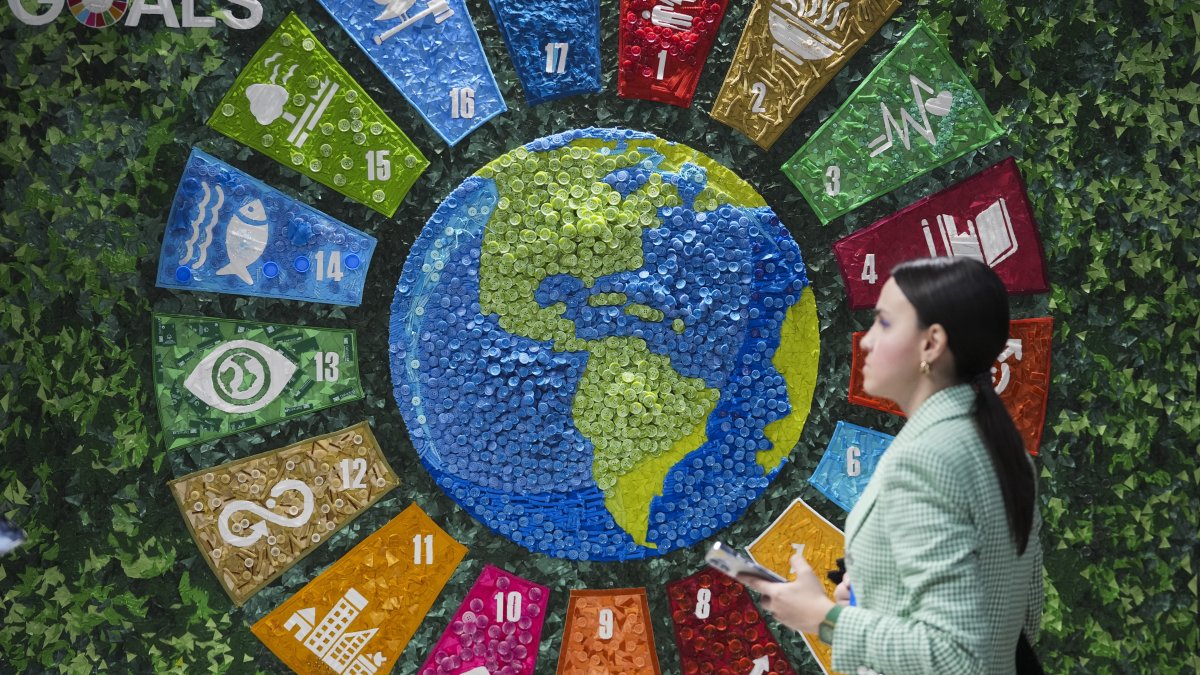Türkiye and Australia were called on Monday to resolve their long-running tussle over who will host next year’s COP31 summit, with the United Nations climate chief calling the delay unhelpful and unnecessary.
The two countries submitted bids to host the high-profile conference in 2022 and they have both refused to concede to the other ever since.
Simon Stiell, executive secretary of the U.N. Framework Convention on Climate Change, which oversees COP summits, said the deadlock was undermining preparations.
“A decision needs to be made very quickly,” he said at a Smart Energy Council event in Sydney. “The two proponents need to come together and between themselves and within the group to make that decision. The delay in making that decision is unhelpful to the process.”
The annual U.N. talks rotate through five regional groups. COP31’s host must be unanimously agreed upon by the 28 members of the Western Europe and Others Group (WEOG) bloc.
The U.N. had set a deadline of June for the group to reach consensus.
Despite Türkiye’s overwhelmingly greater experience in hosting global geopolitical events, its location and renewable energy sector, it has encountered pressure to drop out of the race. Ankara has instead doubled down on its efforts during interim talks in Bonn last month.
Ankara pointed out that its Mediterranean location would help reduce emissions from flights bringing delegates to the conference, and noted its substantially smaller oil and gas industry compared to Australia.
It has been promising a world-class COP31 venue in Antalya, a seaside city that has previously hosted the G-20, NATO conferences and the Antalya Diplomacy Forum.
Australia is seeking to co-host next year’s summit with the Pacific to showcase its renewable energy transition. It had hoped to secure the bid at COP29 in Azerbaijan.
The U.K., a WEOG member, last week reiterated its support for fellow Commonwealth country Australia, and “expressed the hope that a decision would soon be reached” during Australia-U.K. Ministerial Consultations held in Sydney. Australia and the U.K. have the same head of state.
Stiell said the deadlock was now affecting the planning of the COP process, involving thousands of delegates from 200 member countries.
“In negotiations that are as complex as they are, that lack of clarity creates tensions that are completely unnecessary at this stage,” he said.
Asked for comment, the office of Australian Climate Change Minister Chris Bowen referred to an interview where he claimed Australia’s bid had the backing of 23 out of 28 WEOG members.
Australia had also approached Türkiye multiple times to find a “win-win” solution, he said. “We’ve got the votes. We could have all the votes in the world. If Turkey is not going to withdraw, that’s still a challenge,” Bowen told The Conversation Politics Podcast on Thursday.
At the same event, Stiell also called on Australia to set an ambitious 2035 emissions target and accelerate its clean energy transition.
Australia’s national climate plan, due in September, would be a “defining moment” that could send a message that “this country is open for clean investment, trade, and long-term partnerships,” he said.
Brazil is hosting COP30 in November this year on behalf of the Latin American and Caribbean region. The event holds significance as it will focus on assessing countries’ updated climate targets for 2035. Analysts have referred to it as possibly the most pivotal summit since the 2015 Paris COP, where the key climate agreement was established.
Türkiye has felt the effects of climate change, with repeated extreme weather events, including heat waves. Major Turkish lakes, such as Lake Van in the east and Lake Tuz in Central Anatolia, are drying up.
In October 2021, Türkiye became the last Organisation for Economic Co-operation and Development (OECD) and G-20 country to sign the Paris Agreement on limiting the effects of climate change.
According to official statistics, 36.2% of Türkiye’s electricity was generated from coal in 2023, and 21% from natural gas. Hydropower contributed 19.3%, wind 10%, and solar power 7%.
Türkiye boasts more than 33 gigawatts (GW) of installed capacity in wind and solar energy. It plans to lift this figure to 120 GW by 2035, according to the government’s targets.
It aims at reducing greenhouse gas emissions in line with its commitment to become a net-zero emission economy by 2053.
At COP29 in Azerbaijan, a group of nations, including all European Union member states, Canada, Mexico and Norway, pledged to set climate targets aligned with the Paris Agreement’s aspirational goal of limiting warming to 1.5 degrees Celsius (2.8 degrees Fahrenheit). The U.S. did not join this commitment.
Experts hailed the announcement as a positive sign, particularly as the pace of the energy transition faces challenges and the world continues to break new high-temperature records each year.

The Daily Sabah Newsletter
Keep up to date with what’s happening in Turkey,
it’s region and the world.
SIGN ME UP
You can unsubscribe at any time. By signing up you are agreeing to our Terms of Use and Privacy Policy.
This site is protected by reCAPTCHA and the Google Privacy Policy and Terms of Service apply.

